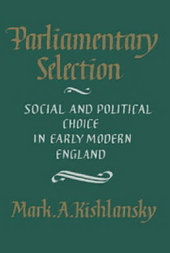
|
Parliamentary Selection: Social and Political Choice in Early Modern England
Paperback / softback
Main Details
| Title |
Parliamentary Selection: Social and Political Choice in Early Modern England
|
| Authors and Contributors |
By (author) Mark A. Kishlansky
|
| Physical Properties |
| Format:Paperback / softback | | Pages:276 | | Dimensions(mm): Height 234,Width 152 |
|
| Category/Genre | British and Irish History
World history - c 1500 to c 1750 |
|---|
| ISBN/Barcode |
9780521311168
|
| Classifications | Dewey:324.94206 |
|---|
| Audience | | Professional & Vocational | |
|---|
| Illustrations |
Worked examples or Exercises
|
|
Publishing Details |
| Publisher |
Cambridge University Press
|
| Imprint |
Cambridge University Press
|
| Publication Date |
26 September 1986 |
| Publication Country |
United Kingdom
|
Description
Parliamentary Selection examines the process by which members of Parliament were chosen in the period between the reigns of Elizabeth II and William III. By focusing on the nature of the selection process, rather than on its results, Professor Kishlansky uncovers a fundamental transformation in assumptions about political behaviour in the early modern period. Until the time of the English Revolution, selection of members of Parliament was a social process dominated by concern about rank and status, personal honor, and community solidarity. County elites organized their selections to reflect the realities of their local social structures, accounting for the influence of the county peerage and greater gentry. Borough elites used local patrons, officeholders, and denizens for nominations to their places. In both county and borough the principle of parliamentry selection was noncompetitive choice.
Reviews'A forceful and penetrating study which obliges us to abandon many of our previous assumptions about the working of seventeenth-century parliamentary elections and has important implications for our understanding of the 'democratic' electoral process in general.' Professor J. P. Kenyon, University of St. Andrews 'A startling thesis, brilliantly sustained, and written with eit and panache.' J. S. Morrill, Selwyn College, Cambridge
|